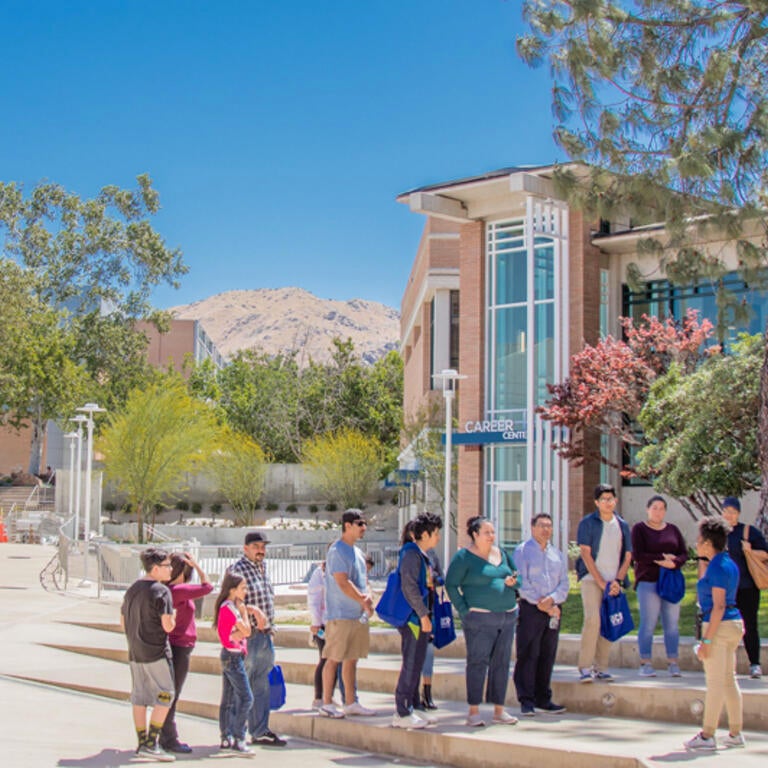
Out-of-State
Follow Your Dreams to California
Turn your passion into purpose as part of the UCR family. Our award-winning faculty will mentor you. Our diverse campus community will embrace you. And our dedicated resources will help you build your future! Sunny Southern California invites you to make the University of California, Riverside your home away from home.
We've been waiting for a bold and brilliant Highlander just like you!
Quick Links
First-Year Requirements
A-G Requirements
Students must achieve a minimum grade point average (GPA) of 3.0 in all college preparatory (A-G) courses, or 3.4 for non-California residents, based on grades earned during Grades 10 and 11, including summer sessions. Courses taken in Grades 9 and 12 can still be used to meet subject requirements, if a grade of C or better was earned. Honors level courses — including approved AP classes, IB classes, and transferable college courses — may also receive extra GPA weight.
History/Social Science
2 Years Required
English
4 Years Required
Mathematics
3 Years Required
4 Years Recommended; must include Geometry
Science
2 Years Required
3 Years Recommended
Language other than English (or other second language)
2 Years Required
3 Years Recommended
Visual and performing arts
1 Year Required
College-Preparatory elective
1 Year Required
Find out if your course is UC approved, and if your college course or SAT/AP/IB exam score meets an A-G requirement.
-
Test Free
UC Riverside will not consider SAT or ACT test scores when making admission decisions or awarding scholarships. If you choose to submit test scores as part of your application, they may be used as an alternative method of fulfilling minimum requirements for eligibility or for course placement after you enroll.
-
Grade Point Average (GPA) Requirement
Students must earn a minimum GPA of 3.0 (3.4 for non-California residents) in all A-G courses. Only the grades you earned in A-G subjects in Grade 10 and 11 — including summer sessions — are used to calculate your preliminary GPA. Courses you took in Grades 9 and 12 can be used to meet A-G subject requirements if you earned a grade of C or higher.
Approved honors-level courses may also include acceptable AP classes, higher- (and some standard-) level IB classes and transferable college courses.
-
Personal Insight Questions (PIQ)
The personal insight questions are your chance to show us who you are — your life experiences, passions, and what drives you. Share what matters most and how you’d add to the UCR Highlander community. Let your story and personality shine!
- You must answer 4 out of 8 questions. Each answer is limited to 350 words.
- All questions are given equal consideration in the application review process.
- We recommend selecting questions that reveal the most about you and best reflect your experiences.
-
Comprehensive Review
Comprehensive review is the process by which UCR evaluates first-year applicants, who meet minimum UC requirements, using multiple measures of achievement and promise, while considering the context in which each student has demonstrated accomplishment.
Exams
Exam Credit
Advanced Placement (AP) courses can demonstrate subject mastery. Students who earn scores of 3, 4, or 5 on the AP examinations will receive credit toward graduation at UCR.
International Baccalaureate (IB) scores can be used to showcase academic mastery. Students who earn scores of 5,6, or 7 on the AP examinations will receive credit toward graduation at UCR.
A-Level letter grades of A, B or C are considered for transfer credit toward your bachelor's degree. The exact credit amount is determined after you are formally admitted and provide your official certificate.
To receive unit credit toward the baccalaureate degree, you must submit an official copy of your exams directly from the testing agency. This can be done in the summer following your high school graduation. Other entrance exams taken after high school graduation are not considered.
International Exams
In addition to general requirements, demonstration of English proficiency is required if your native language is not English, and your secondary/high school education was in a country where English is not the language of instruction. To learn more, visit International Students.
To demonstrate English proficiency, take one of the following:
| Examination | Minimum Score |
| Test of English as a Foreign Language (TOEFL) | 80 |
| International English Language Testing System (IELTS) | 6.5 |
| Duolingo English Test (DET) | 115 |
Transfer Requirements
- Complete at least 60 semester (90 quarter) units of UC-transferable credit.
- Earn at least a 2.4 GPA in UC-transferable courses (2.8 if you're not a California resident).
- Some majors may require a higher GPA for admission selection.
- Complete the following 7-course pattern by the end of the spring term prior to fall enrollment at UC.
- Two transferable courses in English composition;
- One transferable course in mathematical concepts and quantitative reasoning;
- Four transferable college courses chosen from at least two of the following subject areas:
- Arts and humanities
- Social and behavioral sciences
- Physical and biological sciences
Learn more about transfer requirements for international students.
First-Year Viewbook | Out-of-State
Learn more about UCR, its remarkable students, world-class faculty, and beautiful campus.
Achievement Scholarship for Nonresidents
Apply to UCR and if admitted, you’ll be automatically considered for this scholarship! No extra forms, no hassle — just a warm welcome and financial support from a top-tier research university that’s ready to invest in your success.

Scholarship winners receive:
Up to $89,100
for four years for first-year students
Up to $44,550
for two years for transfer students
To be considered:
- Be a confirmed out-of-state or international student.
- Must be UC Eligible.
- Submit your Statement of Intent to Register (SIR) by:
- May 1 for First Years
- June 1 for Transfers
- Maintain a 3.0 GPA during each academic quarter at UCR to continue receiving the scholarship.
Out-of-State Dates and Deadlines
Find the dates of instruction at registrar.ucr.edu.
Aug. 1
Access the UC application.
Oct. 1-Dec. 1
Submit your UC application.
March
First Years: Admission notifications begin.
March 2
Priority deadline to submit your Free Application for Federal Student Aid (FAFSA). (UCR school code: 001316) Late applications can be submitted after March 2, although CSAC administered grant aid may not offered to late applicants.
Verify that a certified GPA was submitted to the California Student Aid Commission by your high school.
April
Transfers: Admission notifications begin.
May 1
First Years: Deadline to submit the Statement of Intent to Register (SIR).
June 1
Transfers: Deadline to submit the Statement of Intent to Register (SIR).
July 1
Deadline to submit your final transcripts/documents for coursework completed through end of spring.
July 15
First Years: Deadline to submit official AP, IB, and A-Level exam scores.
September
Fall quarter begins.







